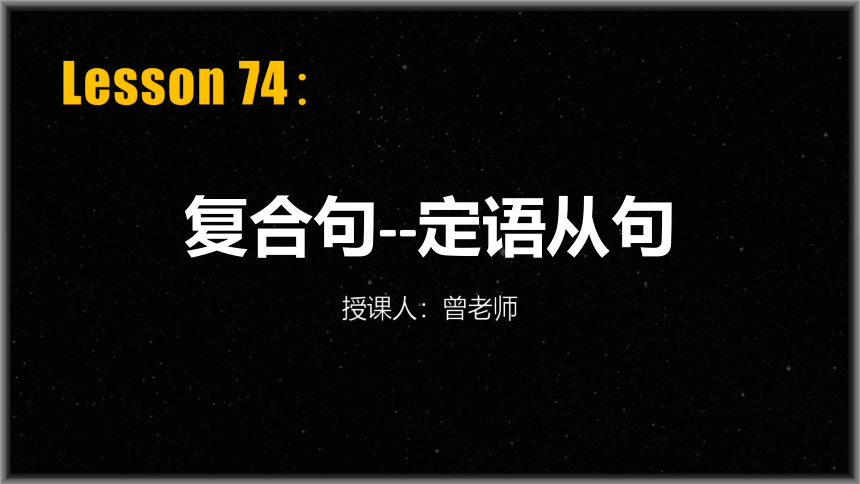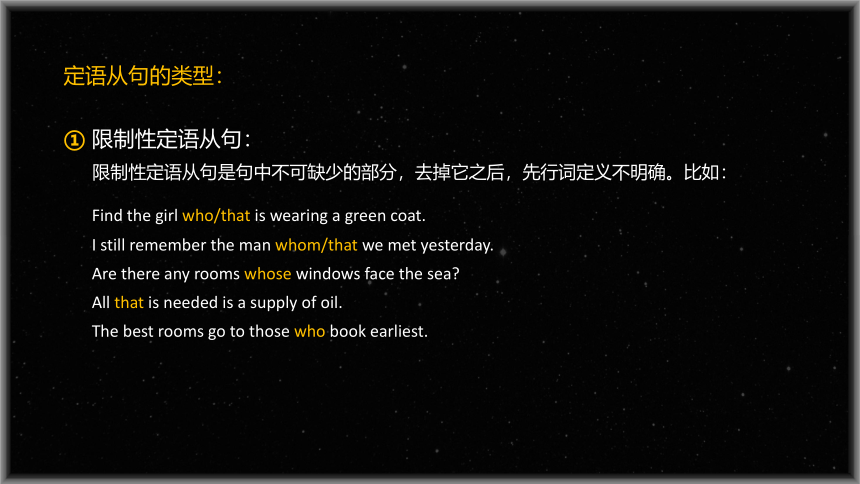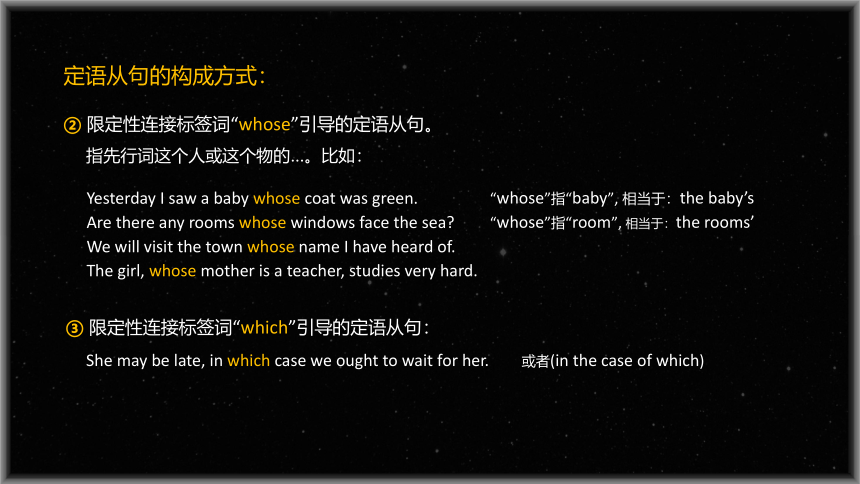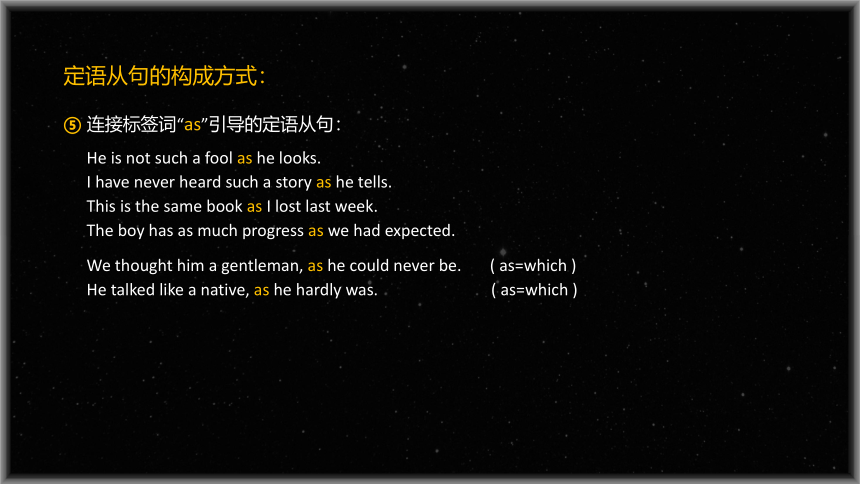L74-复合句之定语从句 初中英语词性句法新讲课件
文档属性
| 名称 | L74-复合句之定语从句 初中英语词性句法新讲课件 |

|
|
| 格式 | ppt | ||
| 文件大小 | 992.0KB | ||
| 资源类型 | 试卷 | ||
| 版本资源 | 通用版 | ||
| 科目 | 英语 | ||
| 更新时间 | 2022-04-11 00:00:00 | ||
图片预览







文档简介
(共15张PPT)
复合句--定语从句
Lesson 74:
授课人:曾老师
定语从句的类型:
① 限制性定语从句:
限制性定语从句是句中不可缺少的部分,去掉它之后,先行词定义不明确。比如:
Find the girl who/that is wearing a green coat.
I still remember the man whom/that we met yesterday.
Are there any rooms whose windows face the sea
All that is needed is a supply of oil.
The best rooms go to those who book earliest.
定语从句的类型:
② 非限制性定语从句:
非限制性定语从句则是附加性的补充说明,去掉了对句子也不会有太大影响。
它与主句之间通常用逗号分开。 比如:
Peter, whom you met in London, is now back in Paris.
Yesterday she sold her car, which she bought just one month ago.
These apple trees, which we planted three years ago, have not borne any fruit.
She heard a terrible noise, which brought her heart into her mouth.
定语从句的构成方式:
① 名称性连接标签词“who/whom, that, which”引导的定语从句:
I am looking for a little boy who/that is in a yellow cap.
Find the girl who/that is wearing a green coat.
I still remember the man whom/that we met yesterday.
Our guide, who was a French Canadian, was an excellent cook.
Peter, whom you met in London, is now back in Paris.
The green coat which/that she is wearing is made of cotton.
This is the house which/that Deng Xiaoping once lived in.
These apple trees, which I planted three years ago, have not borne any fruit.
“which”:指物
“that”:既可以指人也可以指物
“who”:指人(主格)
“whom”:指人(宾格)
▲ 注意:
1. 名称性连接词,既是连接标签词,同时也是代称词。它在从句中如果作主语时,不可以省略。其单复数情况根据先行词来确定。
2. 它在从句中作宾语时,可以省略。
定语从句的构成方式:
Yesterday I saw a baby whose coat was green.
Are there any rooms whose windows face the sea
We will visit the town whose name I have heard of.
The girl, whose mother is a teacher, studies very hard.
② 限定性连接标签词“whose”引导的定语从句。
指先行词这个人或这个物的…。比如:
“whose”指“baby”, 相当于:the baby’s
“whose”指“room”, 相当于:the rooms’
③ 限定性连接标签词“which”引导的定语从句:
She may be late, in which case we ought to wait for her. 或者(in the case of which)
定语从句的构成方式:
Never forget the day when you left your home town.
He will put off the picnic until May 1st, when he will be free.
Gone are the days when they could do whatever they liked.
He visited the house where I lived ten years ago.
They went to London, where they lived for six months.
This is the reason why she will not attend the meeting.
④ 副词性连接标签词“when, where, why”引导的定语从句:
“when”:指在“先行词所说的”那一个时间;
“where”:指在“先行词所说的”那一个地点;
“why”:指因“先行词所说的”那一个原因;
when 指 on that day
when 指 on that day
when 指 on those days
where 指 in this house
where 指 in this city (London)
why 指 because of the reason
定语从句的构成方式:
⑤ 连接标签词“as”引导的定语从句:
He is not such a fool as he looks.
I have never heard such a story as he tells.
This is the same book as I lost last week.
The boy has as much progress as we had expected.
We thought him a gentleman, as he could never be. ( as=which )
He talked like a native, as he hardly was. ( as=which )
“…something that…”与“…what…”:
Do something (that) you know to relax you. = Do what you know to relax you.
Then he said something (that) I can’t understand.
A certain good woman one day said something that hurt her best friend for many years.
He forgot himself and said something that offended(冲犯) his uncle.
It's something that just shouldn't happen in this country.
There is something in what he says.
I feel I’d like to say something about what happened last week.
Say something about what you have learned from the hero.
定语从句的注意事项:
A. “名称性连接标签词”用在介词后作宾语:
Mr. Smith, from whom I have learned a lot, is a famous scientist.
This is the house in which I lived last year.
This is the reason for which he was late for school.
That’s the day on which I met him in the street.
Communication is the process by which we exchange information between people.
This campaign which begins here at the Nairobi National Park allows us to document our diverse wildlife in the national parks and game reserves, ... and conversation projects for which Kenya has become famous. ( ... that/which Kenya has become famous for.)
▲ 需要注意的问题:
1. 介词后面指人时,只能使用“whom”。指物时,只能使用“which”。
2. 是否需要使用介词或使用哪一个介词,取决于从句中动词与先行词的关系。或者说连接词在从句中
要充当哪个介词的宾语。
( in which = where )
( for which = why )
( on which = when )
定语从句的注意事项:
B. “名称性连接标签词”用在介词短语后作宾语:
Light is the fast thing in the world, the speed of which is 300000 kilometer per second.
There are 30 chairs in the small hall, most of which are new.
China has a lot of islands, one of which is Hainan.
There are a lot of students here, none of whom likes the film.
They arrived at a farm house, in front of which sat a small boy.
I saw a man, on the head of whom stood a bird.
I saw some trees, the leaves of which were black with disease.
He mentioned a book, the title of which I’ve forgotten.
The river, the banks of which are covered with trees, is very long.
( = whose leaves )
( = whose title )
定语从句的注意事项:
C. “限定性连接标签词”用在介词短语后:
The driver was the man from whose room she had stolen the maps.
It rained all night and all day, during which time the ship broke into pieces.
定语从句的注意事项:
D. “which”还可以指前面句子提到的内容:
He seems not to have grasped what I meant, which greatly upsets me.
Alice received an invitation from her boss, which came as a surprise.
The weather turned out to be very good, which was more than we could expect.
Today’s weather is great for a long drive, which makes us very exciting.
My father fell ill last year, which ended my dream to go to college.
It rained hard yesterday, for which we couldn’t go to the park.
James had been sick for almost one year, for which she didn’t pass the final exam.
She may be late, in which case we ought to wait for her. 或者(in the case of which)
▲ 注意英文的这种表述方法。
定语从句的注意事项:
E. 注意“名称性连接标签词”与“副词性连接标签词”的区别:
There comes a time when you have to make a choice.
Don’t forget the time that (which) I’ve told you.
I will never forget the days when I stayed with my friend Johnson.
I'll never forget the days that (which) I spent in the countryside.
This is the mountain village where I was born.
This is the mountain village that (which) I visited last year.
I went to the coffee shop where I could have a drink.
I went to the coffee shop which was a cheap place to have a rest.
when 在从句中作状语
which/that 在从句中作宾语
when 在从句中作状语
which/that 在从句中作宾语
where 在从句中作状语
which/that 在从句中作宾语
where 在从句中作状语
which 在从句中作主语
定语从句的注意事项:
F. 定语从句与其它从句的转换:
The parents will use all that they have to send their son to technical school.
= The parents will use what they have to send their son to technical school.
Anyone who spits in public will be punished here.
= Whoever spits in public will be punished here.
复杂定语从句分析:
It is not really success that the British dislike. It’s people using their success in a way that seems
proud or unfair or which separates them from their roots.
试对比: It is not really success what the British dislike.
复合句--定语从句
Lesson 74:
授课人:曾老师
定语从句的类型:
① 限制性定语从句:
限制性定语从句是句中不可缺少的部分,去掉它之后,先行词定义不明确。比如:
Find the girl who/that is wearing a green coat.
I still remember the man whom/that we met yesterday.
Are there any rooms whose windows face the sea
All that is needed is a supply of oil.
The best rooms go to those who book earliest.
定语从句的类型:
② 非限制性定语从句:
非限制性定语从句则是附加性的补充说明,去掉了对句子也不会有太大影响。
它与主句之间通常用逗号分开。 比如:
Peter, whom you met in London, is now back in Paris.
Yesterday she sold her car, which she bought just one month ago.
These apple trees, which we planted three years ago, have not borne any fruit.
She heard a terrible noise, which brought her heart into her mouth.
定语从句的构成方式:
① 名称性连接标签词“who/whom, that, which”引导的定语从句:
I am looking for a little boy who/that is in a yellow cap.
Find the girl who/that is wearing a green coat.
I still remember the man whom/that we met yesterday.
Our guide, who was a French Canadian, was an excellent cook.
Peter, whom you met in London, is now back in Paris.
The green coat which/that she is wearing is made of cotton.
This is the house which/that Deng Xiaoping once lived in.
These apple trees, which I planted three years ago, have not borne any fruit.
“which”:指物
“that”:既可以指人也可以指物
“who”:指人(主格)
“whom”:指人(宾格)
▲ 注意:
1. 名称性连接词,既是连接标签词,同时也是代称词。它在从句中如果作主语时,不可以省略。其单复数情况根据先行词来确定。
2. 它在从句中作宾语时,可以省略。
定语从句的构成方式:
Yesterday I saw a baby whose coat was green.
Are there any rooms whose windows face the sea
We will visit the town whose name I have heard of.
The girl, whose mother is a teacher, studies very hard.
② 限定性连接标签词“whose”引导的定语从句。
指先行词这个人或这个物的…。比如:
“whose”指“baby”, 相当于:the baby’s
“whose”指“room”, 相当于:the rooms’
③ 限定性连接标签词“which”引导的定语从句:
She may be late, in which case we ought to wait for her. 或者(in the case of which)
定语从句的构成方式:
Never forget the day when you left your home town.
He will put off the picnic until May 1st, when he will be free.
Gone are the days when they could do whatever they liked.
He visited the house where I lived ten years ago.
They went to London, where they lived for six months.
This is the reason why she will not attend the meeting.
④ 副词性连接标签词“when, where, why”引导的定语从句:
“when”:指在“先行词所说的”那一个时间;
“where”:指在“先行词所说的”那一个地点;
“why”:指因“先行词所说的”那一个原因;
when 指 on that day
when 指 on that day
when 指 on those days
where 指 in this house
where 指 in this city (London)
why 指 because of the reason
定语从句的构成方式:
⑤ 连接标签词“as”引导的定语从句:
He is not such a fool as he looks.
I have never heard such a story as he tells.
This is the same book as I lost last week.
The boy has as much progress as we had expected.
We thought him a gentleman, as he could never be. ( as=which )
He talked like a native, as he hardly was. ( as=which )
“…something that…”与“…what…”:
Do something (that) you know to relax you. = Do what you know to relax you.
Then he said something (that) I can’t understand.
A certain good woman one day said something that hurt her best friend for many years.
He forgot himself and said something that offended(冲犯) his uncle.
It's something that just shouldn't happen in this country.
There is something in what he says.
I feel I’d like to say something about what happened last week.
Say something about what you have learned from the hero.
定语从句的注意事项:
A. “名称性连接标签词”用在介词后作宾语:
Mr. Smith, from whom I have learned a lot, is a famous scientist.
This is the house in which I lived last year.
This is the reason for which he was late for school.
That’s the day on which I met him in the street.
Communication is the process by which we exchange information between people.
This campaign which begins here at the Nairobi National Park allows us to document our diverse wildlife in the national parks and game reserves, ... and conversation projects for which Kenya has become famous. ( ... that/which Kenya has become famous for.)
▲ 需要注意的问题:
1. 介词后面指人时,只能使用“whom”。指物时,只能使用“which”。
2. 是否需要使用介词或使用哪一个介词,取决于从句中动词与先行词的关系。或者说连接词在从句中
要充当哪个介词的宾语。
( in which = where )
( for which = why )
( on which = when )
定语从句的注意事项:
B. “名称性连接标签词”用在介词短语后作宾语:
Light is the fast thing in the world, the speed of which is 300000 kilometer per second.
There are 30 chairs in the small hall, most of which are new.
China has a lot of islands, one of which is Hainan.
There are a lot of students here, none of whom likes the film.
They arrived at a farm house, in front of which sat a small boy.
I saw a man, on the head of whom stood a bird.
I saw some trees, the leaves of which were black with disease.
He mentioned a book, the title of which I’ve forgotten.
The river, the banks of which are covered with trees, is very long.
( = whose leaves )
( = whose title )
定语从句的注意事项:
C. “限定性连接标签词”用在介词短语后:
The driver was the man from whose room she had stolen the maps.
It rained all night and all day, during which time the ship broke into pieces.
定语从句的注意事项:
D. “which”还可以指前面句子提到的内容:
He seems not to have grasped what I meant, which greatly upsets me.
Alice received an invitation from her boss, which came as a surprise.
The weather turned out to be very good, which was more than we could expect.
Today’s weather is great for a long drive, which makes us very exciting.
My father fell ill last year, which ended my dream to go to college.
It rained hard yesterday, for which we couldn’t go to the park.
James had been sick for almost one year, for which she didn’t pass the final exam.
She may be late, in which case we ought to wait for her. 或者(in the case of which)
▲ 注意英文的这种表述方法。
定语从句的注意事项:
E. 注意“名称性连接标签词”与“副词性连接标签词”的区别:
There comes a time when you have to make a choice.
Don’t forget the time that (which) I’ve told you.
I will never forget the days when I stayed with my friend Johnson.
I'll never forget the days that (which) I spent in the countryside.
This is the mountain village where I was born.
This is the mountain village that (which) I visited last year.
I went to the coffee shop where I could have a drink.
I went to the coffee shop which was a cheap place to have a rest.
when 在从句中作状语
which/that 在从句中作宾语
when 在从句中作状语
which/that 在从句中作宾语
where 在从句中作状语
which/that 在从句中作宾语
where 在从句中作状语
which 在从句中作主语
定语从句的注意事项:
F. 定语从句与其它从句的转换:
The parents will use all that they have to send their son to technical school.
= The parents will use what they have to send their son to technical school.
Anyone who spits in public will be punished here.
= Whoever spits in public will be punished here.
复杂定语从句分析:
It is not really success that the British dislike. It’s people using their success in a way that seems
proud or unfair or which separates them from their roots.
试对比: It is not really success what the British dislike.
同课章节目录
- 词法
- 名词
- 动词和动词短语
- 动词语态
- 动词时态
- 助动词和情态动词
- 非谓语动词
- 冠词
- 代词
- 数词和量词
- 形容词副词及其比较等级
- 介词和介词短语
- 连词和感叹词
- 构词法
- 相似、相近词比较
- 句法
- 陈述句
- 一般疑问句和否定疑问句
- 特殊疑问句及选择疑问句
- 反意疑问句
- 存在句(There be句型)
- 宾语从句
- 定语从句
- 状语从句
- 主谓一致问题
- 简单句
- 并列句
- 复合句
- 主谓一致
- 主、表语从句
- 名词性从句
- 直接引语和间接引语
- 虚拟语气
- 感叹句
- 强调句
- 倒装句
- 祈使句
- 句子的成分
- 句子的分类
- 题型专区
- 单项选择部分
- 易错题
- 完形填空
- 阅读理解
- 词汇练习
- 听说训练
- 句型转换
- 补全对话
- 短文改错
- 翻译
- 书面表达
- 任务型阅读
- 语法填空
- 其他资料
